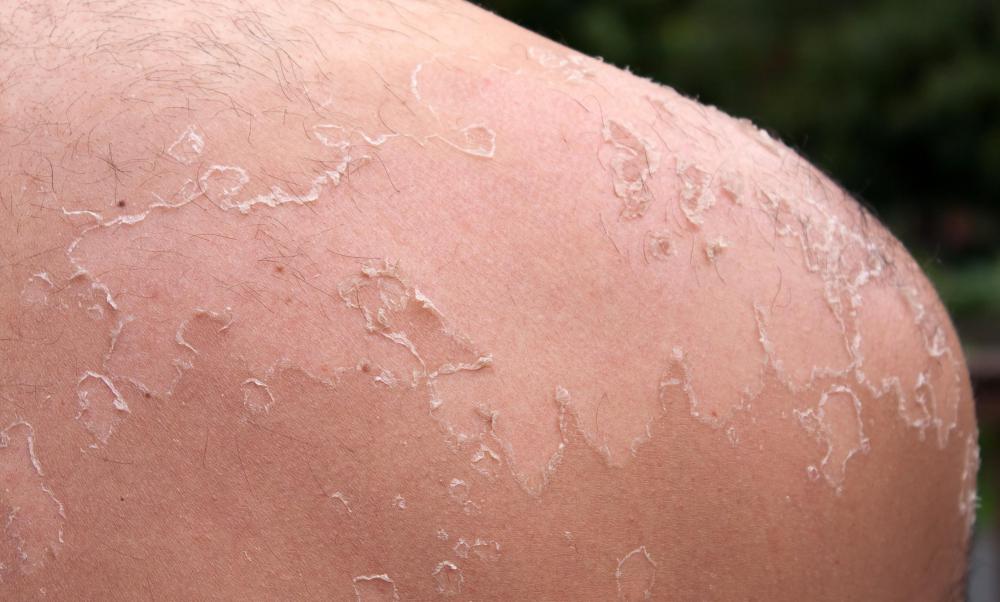At WiseGEEK, we're committed to delivering accurate, trustworthy information. Our expert-authored content is rigorously fact-checked and sourced from credible authorities. Discover how we uphold the highest standards in providing you with reliable knowledge.
What is Rosehip Oil?
Round red seed pods, called rosehips, remain on a rose bush after the petals have fallen away. Rosehip oil is derived from these pods and is both nutritious and useful in treating and caring for skin. The specific properties of rosehips will vary from plant to plant depending on climate, growing conditions, and time of harvest. Rosa Mosqueta is the botanical name for rosehips.
Rosehip oil effectively treats a wide variety of skin issues including combating dryness. It is commonly used to fight eczema and can be found in many moisturizing products promising to return skin’s youthful glow. Some consumers report a reduction in wrinkles with its use and claims exist that it helps to combat premature aging. Crows' feet and fine lines around the mouth may become less noticeable when regularly massaged with rosehip oil.

The oil is quickly absorbed into dry tissue to help restore moisture balance and combat dryness. A natural moisturizer, rosehip oil can be especially effective on sensitive, allergic, and problem skin and is often added to lotions and creams. Because it is all-natural and toxin-free, it has few indications of irritation and allergic sensitivity. Rosehip oil can be applied directly to the skin even in concentrated forms.

Also said to even skin tone, rosehip oil can be used to alleviate redness and reduce hyperpigmentation. Used regularly, it is reported to restore skin’s normal color and reduce blotchy uneven patches. Promising to improve skin quality and appearance, products containing rosehip oil can be quite costly. Sunburned skin can benefit from this oil, promoting faster healing and reducing long-term damage.

Old and new scars treated with rosehip oil are said to become less noticeable. Massaging it into a healing area can prevent the development of keloid (raised and lumpy) scars. Some claim that it lessens the severity of stretch marks, chicken pox, and acne scars.
Rosehip oil does not have a long shelf life and can be expensive to purchase. It can be made at home by harvesting seed pods from a rose bush that has not been treated with pesticides. Two cups of rosehips should be combined with one cup of oil. Vegetable or olive oil can be used, but a lighter oil such as almond oil may work best. Combine the oil and seed pods in the bottom of a small slow cooker and heat on low for eight hours.
After slow cooking, the mixture should be strained through a cheesecloth. Storing it in a dark bottle away from direct sunlight and extreme heat will help preserve it. Dried rosehips can also be used with this method.
AS FEATURED ON:
AS FEATURED ON:















Discussion Comments
I use rosehip (neat) daily, and I don't have any breakouts. I wash my face first and then apply it to clean skin.
I have had a red crusty patch on my cheek for two years - I was recommended Rose Hip Oil and after the first three applications (over two days) the skin was smoother and the redness reduced by 80 percent. Worth trying.
can you drink rose hip oil for arthritis problems in the hands? --sore hand
One of the reasons rosehip oil has so many benefits is because it has a bunch of Vitamins A and E.
This helps the skin produce new cells, and also boosts collagen production, both of which are critical in the fight against aging.
The Vitamin E also makes it especially good for those with aging skin, since it is so gentle.
@Littleman -- While rosehip oil is not totally non-comedogenic, it does have a low probability of clogging the skin.
I would say a lot would depend on how broken out or oily your skin was to begin with.
Although it is a "dry" oil, which means it soaks in really easily, using rosehip oil on acne is not recommended.
After all, it is an oil, and some products with rosehip oil may combine it with heavier, more comedogenic oils.
Your best bet would be to spot test it, and see how it goes from there.
Does anybody know if rose hip oil is comedogenic, i.e., will it clog my pores if I use it on my face?
I really want to use it on my acne scars, but it looks and feels so oily that I'm afraid to use it in case it causes a new breakout.
Post your comments